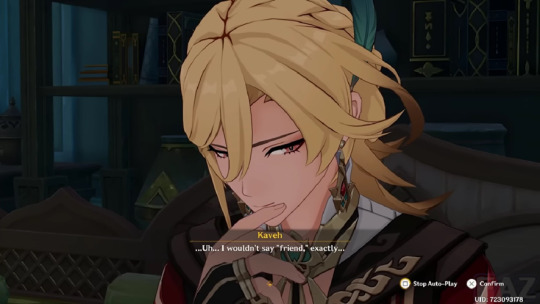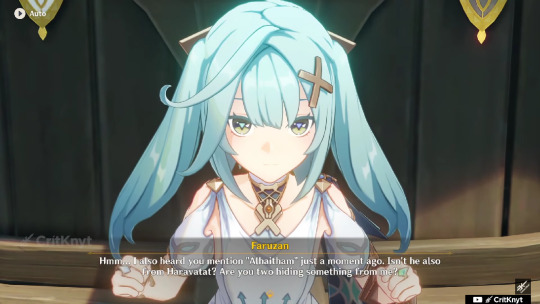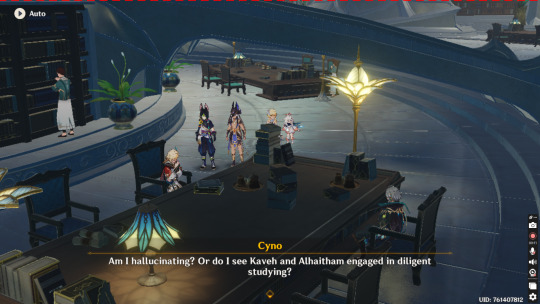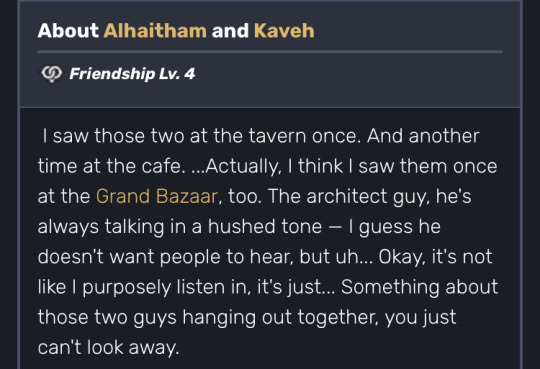#oh the things i would do to witness the sheer gayness of them both
Explore tagged Tumblr posts
Text
It's so crazy to me that sethos said "you just can't look away?" Like what did you mean by that sethos 🤨🤨
analysing queercoding in sethos's haikaveh voice-line
(This analysis is from my Haikaveh queercoding essay found here!)
In Cyno’s Story Quest II Alhaitham and Kaveh’s progression goes unspoken by the Traveller and Paimon in comparison to previous events and quests where their relationship is questioned (which you can read here!)



This lack of mention of the visible progression of their relationship points to a secrecy that the player is not privy to, and this development is only mentioned when Cyno highlights the unlikeliness of Kaveh and Alhaitham studying together in the House of Daena

Kaveh and Alhaitham’s relationship has tangibly improved, in their dialogue with each other, their listening and comprehension of each other, and their active reliance on each other, however, a status of their relationship has still yet to be given.
With the lack of questioning from the surrounding cast, this appears to be a continual deliberate method of avoiding labelling Alhaitham and Kaveh’s relationship status (further discussed here). This aligns with the previous method of queercoding Alhaitham and Kaveh’s relationship in avoiding labels of friends, and here, it can be seen that labels such as ‘roommates’ are also avoided. This omission continues to be deliberate, and it is even more poignant due to the progression of their relationship, alongside the secrecy of what it entails and how it came about.
Sethos’ voice-line about the two highlights this to an extreme. As discussed, his voice-line is entitled ‘About Alhaitham and Kaveh’, and is the only voice-line in the game to pair together two characters when a character gives an opinion of another.
In this, Alhaitham and Kaveh are inextricably linked together - not only in being delegated a joint voice-line, but also due to Sethos’ opinion of them.

This separates them from the crowd due to an intimacy shared between the two of them. Sethos states that Kaveh is always speaking, to Alhaitham, in a low voice, as if to not let others overhear. This directly indicates a secrecy between Alhaitham and Kaveh which is not to be breached by the crowd, Sethos, and the player included, as Sethos fails to overhear anything to relate back to the player.
Sethos finishes by claiming that when Alhaitham and Kaveh are “together”, they become a different force entirely as if they were alone, as seeing them together means “you just can’t look away.”
Sethos’s voice-over creates an allusion to a secret existing between Alhaitham and Kaveh, and this secret conveys very much the essence of queercoding itself??
The two discuss something which cannot be known to the player, or someone attempting to breach the line between the public display of their relationship and that of their private relationship. This private relationship occurs outside of the player’s knowledge and pertains to the development of their relationship, along with what the two now consider the other.
The ambiguity of their relationship here only continues to point to the two’s connectedness, in that they are coupled together by an outsider. It’s interesting that rather than the personal pronoun ‘I’, Sethos uses the collective pronoun ‘you’ when referring to Alhaitham and Kaveh as a pair.
This directly addresses the player, and draws attention to the uniqueness of their relationship. Yet again, this is the same method used to purposefully cause the player to question Alhaitham and Kaveh’s relationship – and, just as other instances, there is no clarification.
This secret that is generated between Alhaitham and Kaveh directly equates to the idea of queercoding, as no definitive answer is given as to what exactly the secret, or intimacy, is – and this aligns with the game’s inability to confirm queer characters or relationships.
Alhaitham and Kaveh having reconciled is considered of prominent importance. This is seen in their balanced viewpoints having the power to bring about good for others, but here, it is specifically highlighted that Alhaitham and Kaveh are ‘other’. They are separate from the crowd, regardless of being surrounded, and they are perpetually in their own private sphere, despite attempting to be intruded upon by an eavesdropper.
Together, they become a unit that stands out, and yet this is contrasted by the intimacy of their togetherness. It is unknown what the two discuss, only that it is private between the two of them alone. This intimate covertness, this secrecy, in the presentation of Alhaitham and Kaveh’s relationship demonstrates the usage of queercoding.
As established here, this aligns with the queer taboo, in that closeted queer people live a life secret to the heteronormative public, and thus become ‘other’ in this secret part of themselves. The secrecy of Alhaitham and Kaveh’s relationship can correlate with the real-world negation from heteronormative bonds, found in queer relationships not accepted by the society around them.
This is seen in how the true nature of their relationship is avoided within the game, and, yet, is highlighted by several characters for the player to question. This lack of answer, as established, leaves the interpretation to the player. It appears deliberate that Alhaitham and Kaveh’s relationship status is constantly called into question in previous quests and events, but their relationship, when improved, goes unmentioned by the very characters that once questioned it, such as Paimon.
Yet again, Alhaitham and Kaveh’s relationship is styled to deliberately avoid labels, and yet, their closeness is deliberately highlighted. Along with this, the secrecy of their private life is poignant, seen in both Sethos’ voice-line and in the ambiguity of their relationship in Cyno’s Story Quest II.
With this method, the game purposefully allows for questions which ask as to the specific nature of Alhaitham and Kaveh’s relationship – just as it deliberately avoids giving a specific answer. Highlighting the two’s closeness, and the ambiguity of this, is an active method of queercoding.
#the energy must be CRAZY#i know sethos went '🤨🏳️🌈?'#oh the things i would do to witness the sheer gayness of them both#flower rambles
148 notes
·
View notes